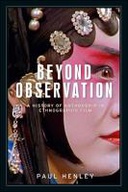Explore

This book analyses the authoring of ethnographic films between 1895 and 2015. It is based on the general argument that the ethnographicness of a film should not be gauged according to whether it is about an exotic culture, but rather by the degree to which it conforms to the norms of ethnographic practice more generally. On these grounds, it considers films made in a broad range of styles, on a wide range of topics and in many different parts of the world. For the period before the Second World War, it discusses films made within reportage, travel and melodrama genres as well as more conventionally ethnographic films. In the postwar period, it examines the work of film-makers such as John Marshall, Asen Balikci, Ian Dunlop and Timothy Asch and considers the modes of authorship developed by Jean Rouch, Robert Gardner and Colin Young. It also discusses films authored by indigenous subjects using video technology from the 1970s, and the ethnographic films that flourished on British television until the 1990s. In the final part, it examines the recent work of David and Judith MacDougall, the Harvard Sensory Ethnography Lab, and various films authored in a participatory manner as possible models for the future.
This book is included in DOAB.
Why read this book? Have your say.
You must be logged in to comment.
